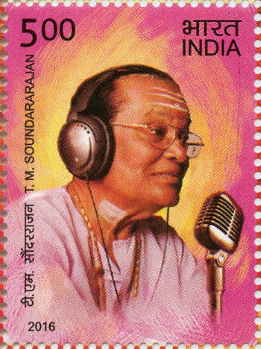
Thoguluva Meenatchi Iyengar Soundararajan, popularly known as TMS, was an Indian Carnatic musician and a playback singer in Tamil cinema for over six and a half decades. He sang over 10,138 songs from 3,162 films, including devotional, semi-classical, Carnatic, classical and light music songs. He gave classical concerts starting in 1943.

Central Studios was an Indian film studio in the neighbourhood of Singanallur, Coimbatore in Tamil Nadu, started by B.Rangaswamy Naidu and other prominent industrialists like Swamikannu Vincent of Coimbatore in 1935 to make Tamil and other South Indian language movies. The studio was a major hub of Tamil movie production and notable for its association with many early day Tamil Movie Superstars, directors and script writers etc. and many making their career debuts here. The studio is best remembered for movies like Sivakavi, Velaikari and Haridas.

Mayavaram Krishnasamy Thiyagaraja Bhagavathar, also known by his initials as M. K. T., was an Indian actor, producer, and Carnatic singer. He is considered to be one of the most successful actors in Tamil cinema ever.

Haridas is a 1944 Tamil language film directed by Sundar Rao Nadkarni and starring M. K. Thyagaraja Bhagavathar, T. R. Rajakumari and N. C. Vasanthakokilam.

Sri Murugan is a 1946 Indian Tamil-language film produced by Jupiter Pictures and directed by M. Somasundaram and V. S. Narayanan. The film featured Honnappa Bhagavathar in the lead role. M. G. Ramachandran performed a dance number, Shiva Thandavam along with K. Malathi in the film.
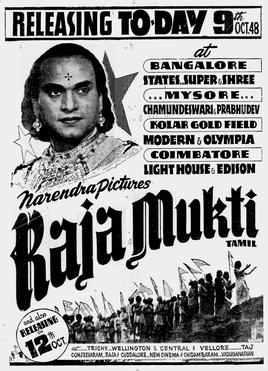
Raja Mukthi is a 1948 Indian Tamil language film starring M. K. Thyagaraja Bhagavathar, V. N. Janaki and P. Bhanumathi. M. G. Ramachandran had done a supporting role. The film was released on 9 October 1948.
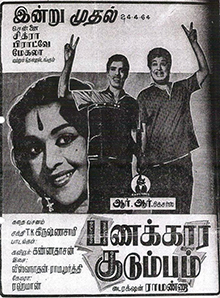
Panakkara Kudumbam is a 1964 Indian Tamil-language film starring M. G. Ramachandran. The film was released on 24 April 1964, and ran more than 150 days in theatres. The film was remade in Hindi in 1970 as Humjoli, in Kannada in 1978 as Bhale Huduga, and in Telugu in 1984 as Intiguttu. All versions except Intiguttu were directed by the same director, T. R. Ramanna.

Pavalakkodi is a 1934 Tamil language film starring M. K. Thyagaraja Bhagavathar and directed by K. Subramanyam. It was the first film for both of them. The film's music was composed by Papanasam Sivan.

Chintamani is a 1937 Indian Tamil-language film directed by Y. V. Rao starring M. K. Thyagaraja Bhagavathar, Serugulathur Sama and Aswathamma. It was the first Tamil film to run for a year in a single theatre.

Ambikapathy is a 1937 Indian Tamil musical period film directed by American film director Ellis R. Dungan. It starred M. K. Thyagaraja Bhagavathar, M. R. Santhanalakshmi, Serugulathur Sama, T. S. Balaiya, N. S. Krishnan, T. A. Madhuram and P. G. Venkatesan. Ambikapathy is regarded as one of the greatest hits of pre-independence Tamil cinema. Ambikapathy, along with Chintamani were the greatest hits of 1937 and made critics regard Bhagavathar as the "first superstar of Tamil cinema". This was the first Tamil film to name a music director in its credits.
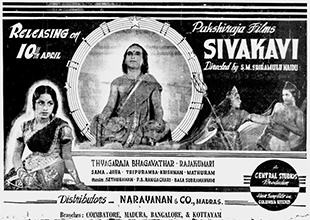
Sivakavi is a 1943 Indian Tamil-language film directed, initially, by P. K. Raja Sandow and later, S. M. Sriramulu Naidu. It starred M. K. Thyagaraja Bhagavathar, S. Jayalakshmi, Serukalathur Sama, Thirupurambal, T. R. Rajakumari, N. S. Krishnan and T. A. Mathuram. The film's screenplay was written by Thiru Muruga Kirubanandha Variyar. The film was shot at Central Studios and released by Pakshiraja Films in Coimbatore. The film was released on 10 April 1943.
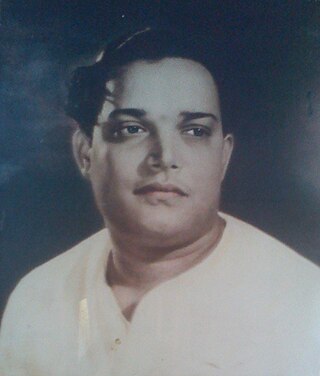
C. R. Subbaraman also known as C. S. Ram (1916–1952) was a famous South Indian film music composer and producer. He was born to Ramasamy at Chintamani village in Thirunelveli, in present-day Tamil Nadu. Music director Shankar of Shankar–Ganesh duo was his younger brother. His ancestors were from the Krishna district of present-day Andhra Pradesh and due to this, his family spoke Telugu well.

Gopalan Ramanathan was an Indian music composer for Tamil movies. He is also known as Isai Methai or Sangeetha Chakravarthy and is considered to be one of the influential Tamil music composers to take Carnatic music to the masses. Notable for his association with M. K. Thyagaraja Bhagavathar. G. Ramanathan also composed for films of Salem Modern Theatres and Coimbatore Central Studios. His career lasted until his death in 1963. During the 1950s G.Ramanathan's music dominated most of the box office hits of the then leading Tamil movie stars Shivaji Ganesan and M. G. Ramachandran.
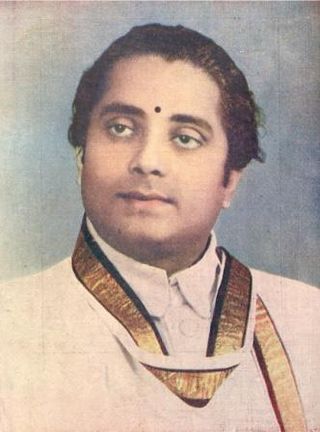
Chowdasandra Honnappa Bhagavathar was an Indian theatre and film actor, producer, musician and singer. He was best known as a singer and as one of the pioneers of Kannada cinema. He was also active in Tamil cinema. Bhagvathar is known for bringing actress Saroja Devi into the industry. His son Bharath was also an actor who worked in Kannada films and serials.

Ther Thiruvizha is a 1968 Indian Tamil-language drama film, directed by M. A. Thirumugam. The film stars M. G. Ramachandran and Jayalalithaa. It was released on 23 February 1968.

Bilhana is a 1948 Indian Tamil-language historical romance film directed by B. N. Rao and produced by Mubarak Pictures. Based on the life of the Kashmiri poet of the same name, the film stars K. R. Ramasamy and A. R. Sakunthala. It was released on 1 November 1948.

Arul Soosai Anthony Samy (1915–1998) was an Indian director and screenwriter who worked in Tamil films.

Shyamala is a 1952 Indian Tamil-language film directed by B. A. Subba Rao. The film stars M. K. Thyagaraja Bhagavathar and S. Varalakshmi. It was released on 29 November 1952.

Nathayil Muthu is a 1973 Indian Tamil-language film directed, produced and written by K. S. Gopalakrishnan. The film stars K. R. Vijaya and R. Muthuraman, publicised as the former's 100th film as an actress. It was released on 25 October 1973.
Lena Chettiar was an Indian film producer from Chettinad known for his works in Tamil cinema.



















